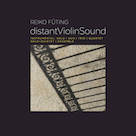

Reiko Füting: distantViolinSound
New Focus Recordings
The enigmatically titled distantViolinSound is as provocative a portrait collection as we've come to expect from Reiko Füting (b. 1970), whose work's described in text accompanying the release as an exercise in “assimilation, dissimilation, integration, disintegration, and segregation.” Such qualities certainly factor into his fifth New Focus Recordings release, on which the German composer enlists the services of numerous new music colleagues to explore issues of memory, history, and temporality. The seven pieces use quotes from the classical repertoire as starting points, but they inevitably qualify as Füting creations, full stop, when all's said and done.
One of the more interesting things about the seventy-three-minute recording is its gradual expansion from one piece to the next. After passage: time (copy) introduces the set with a gripping solo violin performance from Miranda Cuckson, the album advances through duo, trio, and quartet performances until the last settings, F/fern and von der Stadt, feature conductor-led ensembles comprising seven and eleven participants, respectively. That makes for a fascinating trajectory and an album that grows ever more engrossing as it develops. As a representative sampling of contemporary music practice, distantViolinSound succeeds too in presenting performances by violinists Cuckson and Doori Na, pianist Jing Yang, Unheard-of//Ensemble, Quartet121, Noise Catalogue, SchallSpektrum, and Longleash. The instrumental configurations change from one piece to the next, but the violin's ongoing presence establishes an audible through-line.
As the wide-ranging quoted materials indicate, Füting, who's taught at Manhattan School of Music since 2000 and who studied at the Hochschule für Musik Dresden, Houston's Rice University, Manhattan School of Music in New York City, and Seoul National University, clearly knows his musical history. In the opening piece, quotes from not one but five historical figures surface, and while familiar names such as J. S. Bach and Beethoven are drawn upon elsewhere, Heinrich Schütz, Johann Hermann Schein, and even Czech philosopher Vilém Flusser are folded into the presentation too. Füting's musical colleagues are of course distinguished, with each boasting impressive credentials and extensive backgrounds as performers and contemporary music advocates.
Over the course of eleven minutes, passage: time (copy) works quotations from Heinrich Franz Ignaz Biber, August Kühnel, Johann Paul von Westhoff, Johann Georg Pisendel, and Johann Sebastian Bach into its solo violin framework. Cuckson, who commissioned the piece, delivers a mesmerizing performance that's truly a master class. Flurries of phrases cartwheel through the air as the violinist careens furiously from one passage to another with complete authority. A seamless transition is effected from passage: time (copy) to mo(ve)ment for 2: Choreophonie – Schatten/Spiegeltanz – when the latter begins with a two-minute solo violin statement by Doori Na before pianist Jin Yang's entrance. As the focus shifts to the keyboard (played inside and outside), the material ventures into stylistic territory associated with the early twentieth century. Side-long references to Debussy, Wolf, Mahler, and Strauss are made, but again, as filtered through Füting, they're obscured. The work's most striking episode arrives ten minutes in when both musicians execute chromatic ascending and descending runs with remarkable skill and panache.
Drawing on themes from a Beethoven piano trio and weaving spoken excerpts (in German and English) by Beethoven and Flusser into the piece, free: whereof – wherefore is realized by the piano trio Longleash, the rendering most striking for the moments where the piano trio recognizably appears before being just as quickly reduced to fragments. Beethoven's again referenced in Chorale (“those driven out will come”) when Quartet121 performs a piece built in part on the composer's “Heiliger Dankgesang” movement from his op. 132 string quartet. As with the other works, the material's refracted through Füting's prism, the result a piece that sounds both semi-familiar and, in its use of harmonics and convulsive bowings, alien and new. Another quartet performance follows, this one of act: ab-stain, from the Brooklyn-based Unheard-of//Ensemble and its clarinet, violin, cello, and piano configuration. Based on a composition by Heinrich Schütz and a hymn setting by Johann Hermann Schein, the material again exudes a quasi-familiar quality in undergirding its fluttering instrumental and vocal flourishes with a hymn theme.
After Noise Catalogue performs the short yet volatile F/fern, another contemporary music ensemble SchallSpektrum delivers the album's final piece, von der Stadt. Like the other settings, this one draws on pre-existing material—hymn settings by Schein—with fragmented phrases strewn across the foundation like pebbles on a beach. Ten musicians are put through their paces by conductor Jan Michael Horstmann, with the chamber musicians also contributing spoken utterances. Füting is fortunate to have assembled for the performance of these pieces musicians who are clearly sympathetic to his vision. All involved show themselves to be totally on the same page as the composer as they give these seven works vivid and vibrant readings, and often they're called upon to augment their instrumental contributions with spoken parts and vocal effects. What in less talented hands could come off as merely explorative exercises in their hands registers as exciting music-making of an unusual and inordinately idiosyncratic kind.April 2025